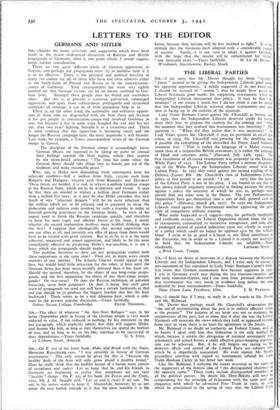THE LIBERAL PARTIES
Slit,—I am sorry that Mr. Davies thought my letter " spiteful." " Janus " seemed to be giving the Independent Liberals good marks for opposing appeasement. I mildly suggested (I do not know why I should be accused of " venom ") that he might have given the Liberal Nationals good marks for supporting rearmament when the Independent Liberals denounced that policy. It may be that "de- nounced" is too strong a word, but I do not think it can be denied that the Independent Liberals wavered about rearmament and were slow in facing up to the realities of the situation.
Lady Violet Bonham Carter quotes Mr. Churchill as having said, in 1939, that the Independent Liberals deserved credit for having done their best to prepare the country for the coming test " from the moment that they realised that rearmament was necessary." The question is : " When did they realise that it was necessary? " As Lady Violet quotes Mr. Churchill, it may be pertitient to recall that when, in 1934, Mr. Churchill was pressing for the doubling and, if possible the redoubling of the shrivelled Air Force, Lord Samuel's comment was: " That is rather the language of a Malay running amok than of a responsible British statesman; it is rather the language of blind and causeless panic " (Hansard, July 13th, 1934). The first instalment of all-round rearmament was proposed in the Defence White Paper of 1935. The Labour Party tabled a motion disapprov- ing of the White Paper; the Independent Liberals voted with the Labour Party. In 1937 they voted against the second reading of the Defence (Loans) Bill. Mr. Churchill's view of Independent Liberal policy at that period is on record: " I am . . . sorry that the leader of the Liberal Party is not in his place. I am bound to say that he has shown himself singularly resourceful in finding excuses for voting against a policy the necessity of which he sees as, perhaps more plainly than any other man in the House. The two Parliamentary Oppositions have got themselves into a sort of dull, general crab on this policy " (Hansard, March 4th, 1937). In 1939 the Independent Liberals voted against the Government motion approving the prin- ciple of compulsory military training.
What really happened is—I suggest—that, for perfectly intelligible and creditable reasons, the Liberal Opposition shrank from the idea of rearmament, rationalised its instinctive repugnance, and only after a prolonged period of painful indecision came out clearly in support of a policy which could no longer be opposed save by the wilfully blind. I claim to be as good a Liberal as any. Other contributor to the discussion, but in order to be a Liberal it is surely not necessary to hold that the Independent Liberals are infallible.—Yours


























 Previous page
Previous page